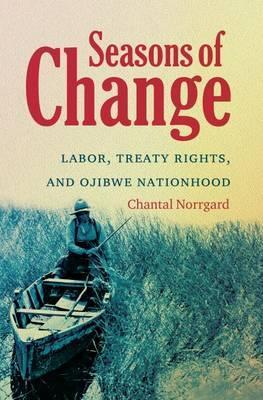Seasons of Change: Labor, Treaty Rights, and Ojibwe Nationhood

Seasons of Change: Labor, Treaty Rights, and Ojibwe Nationhood
From the 1870s to the 1930s, the Lake Superior Ojibwes of Minnesota and Wisconsin faced dramatic economic, political, and social changes. Examining a period that began with the tribe's removal to reservations and closed with the Indian New Deal, Chantal Norrgard explores the critical link between Ojibwes' efforts to maintain their tribal sovereignty and their labor traditions and practices. As Norrgard explains, the tribe's "seasonal round" of subsistence-based labor was integral to its survival and identity. Though encroaching white settlement challenged these labor practices, Ojibwe people negotiated treaties that protected their rights to make a living by hunting, fishing, and berrying and through work in the fur trade, the lumber industry, and tourism. Norrgard shows how the tribe strategically used treaty rights claims over time to uphold its right to work and to maintain the rhythm and texture of traditional Ojibwe life.
Drawing on a wide range of sources, including New Deal-era interviews with Ojibwe people, Norrgard demonstrates that while American expansion curtailed the Ojibwes' land base and sovereignty, the tribe nevertheless used treaty-protected labor to sustain its lifeways and meet economic and political needs--a process of self-determination that continues today.
Descrierea produsului
From the 1870s to the 1930s, the Lake Superior Ojibwes of Minnesota and Wisconsin faced dramatic economic, political, and social changes. Examining a period that began with the tribe's removal to reservations and closed with the Indian New Deal, Chantal Norrgard explores the critical link between Ojibwes' efforts to maintain their tribal sovereignty and their labor traditions and practices. As Norrgard explains, the tribe's "seasonal round" of subsistence-based labor was integral to its survival and identity. Though encroaching white settlement challenged these labor practices, Ojibwe people negotiated treaties that protected their rights to make a living by hunting, fishing, and berrying and through work in the fur trade, the lumber industry, and tourism. Norrgard shows how the tribe strategically used treaty rights claims over time to uphold its right to work and to maintain the rhythm and texture of traditional Ojibwe life.
Drawing on a wide range of sources, including New Deal-era interviews with Ojibwe people, Norrgard demonstrates that while American expansion curtailed the Ojibwes' land base and sovereignty, the tribe nevertheless used treaty-protected labor to sustain its lifeways and meet economic and political needs--a process of self-determination that continues today.
Detaliile produsului












